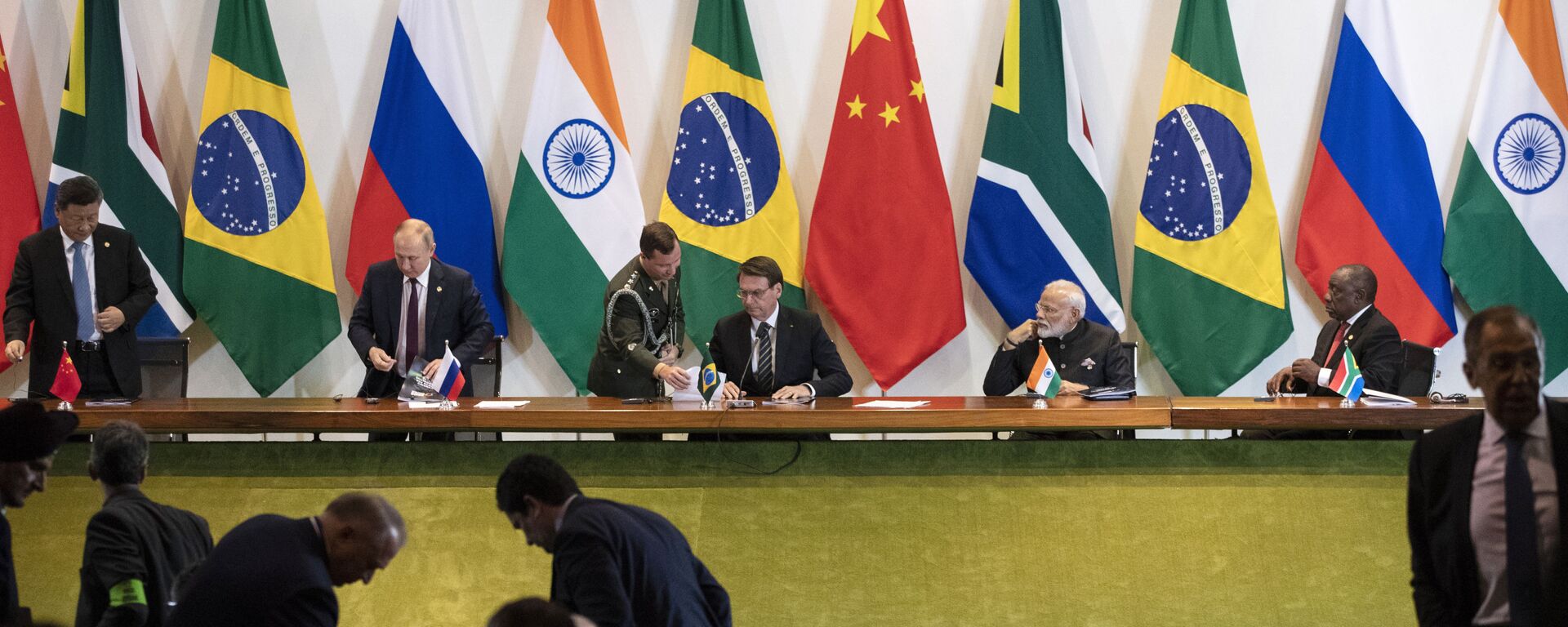https://sputnikglobe.com/20230624/dc-scholars-ukraine-conflict-shows-world-has-grown-weary-of-us-hegemony-1111449771.html
DC Scholars: Ukraine Conflict Shows World Has Grown Weary of US Hegemony
DC Scholars: Ukraine Conflict Shows World Has Grown Weary of US Hegemony
Sputnik International
Despite having the largest military budget in the world and being the largest operator of military bases abroad, the US is far from being a global hegemon... 24.06.2023, Sputnik International
2023-06-24T23:25+0000
2023-06-24T23:25+0000
2023-06-25T02:56+0000
americas
us
joe biden
fiona hill
washington
dc
asean
pentagon
china
https://cdn1.img.sputnikglobe.com/img/07e7/06/01/1110840003_0:160:3072:1888_1920x0_80_0_0_ce57418ee469403a86d6c5f7cb2939fa.jpg
Over the past decades Washington has demonstrated a capacity for mass destruction – in Korea, Vietnam, Afghanistan, Iraq, Libya and elsewhere – but "it has won no more than Pyrrhic victories" which led to the erosion of trust in Pax Americana both at home and abroad, according to Responsible Statecraft scholars.The US military spending reached $876.9 billion in 2022, while the nation also operates a whopping 750 foreign military bases. Still, Washington is incapable of persuading the Global South to join anti-Russia sanctions over the latter's special military operation in Ukraine, the think tank remarks. "If hegemony means the capacity to get other countries to comply with one’s demands, the United States is far from being a global hegemon," the report notes.Judging from the so-called Pentagon leak, even some US allies and partners demonstrated hesitance and unwillingness to provide the Kiev regime with shells, jets and armored vehicles. Meanwhile, most nations of the Global South shrugged off the US calls for slapping sanctions on Moscow as contradicting their national interests.US political observers emphasize that six nations in the Global South – namely, India, Brazil, Turkiye, Indonesia, Saudi Arabia, and South Africa – are set to decide the future of geopolitics and insist that the Biden administration needs to win their hearts and minds. At the same time, European commentators argue that developing nations have the right to remain neutral and non-aligned.For instance, in June 2022, India's External Affairs Minister Dr S Jaishankar shredded the West's claim that New Delhi was "sitting on the fence." According to the minister, India is entitled to its opinion when it comes to the Russo-Ukrainian conflict.Likewise, the Association of Southeast Asian Nations (ASEAN) has chosen to collaborate with both the US and China, instead of taking sides. Moreover, ASEAN nations are active participants of Beijing's Belt and Road Initiative (BRI) regardless of Washington's attempts to maintain its dominance in the region and curb China's influence in the Asia Pacific.Per DC scholars, the emerging trend was articulated by Brookings Institution fellow Fiona Hill, former Deputy Assistant to the President of the United States, in May 2023:According to Hill, the Global South's resistance to the US and the EU's demands to slap sanctions on Moscow is nothing short of "an open rebellion." She noted that "this is a mutiny against what they see as the collective West dominating the international discourse and foisting its problems on everyone else, while brushing aside their priorities on climate change compensation, economic development, and debt relief."Western observers also acknowledge that the world's center of gravity is steadily shifting east, adding that the Biden administration has so far sought to avert this trend by trying to establish "a lasting technological lead over China" and beefing up the US military in Western Pacific.However, "most developing countries, including emerging powers in the Global South, are no longer willing to make zero-sum choices" between Washington and its geopolitical rivals, DC scholars underscore, urging American policymakers to accept the reality that the US is no longer "the indispensable nation."
https://sputnikglobe.com/20230607/new-brics-currency-can-challenge-dollar-hegemony-of-us-led-g7-economic-gang-1110984675.html
https://sputnikglobe.com/20230607/ex-cia-advisor-reveals-date-when-dollars-hegemony-may-start-to-crumble-1110978215.html
americas
washington
dc
china
Sputnik International
feedback@sputniknews.com
+74956456601
MIA „Rossiya Segodnya“
2023
News
en_EN
Sputnik International
feedback@sputniknews.com
+74956456601
MIA „Rossiya Segodnya“
Sputnik International
feedback@sputniknews.com
+74956456601
MIA „Rossiya Segodnya“
us, joe biden, fiona hill, washington, dc, asean, pentagon, china
us, joe biden, fiona hill, washington, dc, asean, pentagon, china
DC Scholars: Ukraine Conflict Shows World Has Grown Weary of US Hegemony
23:25 GMT 24.06.2023 (Updated: 02:56 GMT 25.06.2023) Despite having the largest military budget in the world and being the largest operator of military bases abroad, the US is far from being a global hegemon, argues a DC-based think tank Quincy Institute for Responsible Statecraft.
Over the past decades Washington has demonstrated a capacity for mass destruction – in Korea, Vietnam, Afghanistan, Iraq, Libya and elsewhere – but "it has won no more than Pyrrhic victories" which led to the erosion of trust in Pax Americana both at home and abroad, according to
Responsible Statecraft scholars.
The US military spending reached $876.9 billion in 2022, while the nation also operates a whopping 750 foreign military bases. Still, Washington is incapable of persuading the Global South to join anti-Russia sanctions over the latter's special military operation in Ukraine, the think tank remarks. "If hegemony means the capacity to get other countries to comply with one’s demands, the United States is far from being a global hegemon," the report notes.
Judging from the so-called Pentagon leak, even some US allies and partners demonstrated hesitance and unwillingness to provide the Kiev regime with shells, jets and armored vehicles. Meanwhile, most nations of the Global South shrugged off the US calls for slapping sanctions on Moscow as contradicting their national interests.
US political observers emphasize that six nations in the Global South – namely, India, Brazil, Turkiye, Indonesia, Saudi Arabia, and South Africa – are set to decide the future of geopolitics and insist that the Biden administration needs to win their hearts and minds. At the same time, European commentators argue that developing nations have the right to remain neutral and non-aligned.
For instance, in June 2022, India's External Affairs Minister Dr S Jaishankar shredded the West's claim that New Delhi was "sitting on the fence." According to the minister, India is entitled to its opinion when it comes to the Russo-Ukrainian conflict.
Likewise, the Association of Southeast Asian Nations (ASEAN) has chosen to collaborate with both the US and China, instead of taking sides. Moreover, ASEAN nations are active participants of Beijing's Belt and Road Initiative (BRI) regardless of Washington's attempts to maintain its dominance in the region and curb China's influence in the Asia Pacific.
Per DC scholars, the emerging trend was articulated by Brookings Institution fellow Fiona Hill, former Deputy Assistant to the President of the United States, in May 2023:
"The war in Ukraine is perhaps the event that makes the passing of Pax Americana apparent to everyone. … [Other countries] want to decide, not be told what’s in their interest. In short, in 2023, we hear a resounding no to US domination and see a marked appetite for a world without a hegemon," she said at a conference in Tallinn, Estonia.
According to Hill, the Global South's resistance to the US and the EU's demands to slap sanctions on Moscow is nothing short of "an open rebellion." She noted that "this is a mutiny against what they see as the collective West dominating the international discourse and foisting its problems on everyone else, while brushing aside their priorities on climate change compensation, economic development, and debt relief."
Western observers also acknowledge that the world's center of gravity is steadily shifting east, adding that the Biden administration has so far sought to avert this trend by trying to establish "a lasting technological lead over China" and beefing up the US military in Western Pacific.
However, "most developing countries, including emerging powers in the Global South, are no longer willing to make zero-sum choices" between Washington and its geopolitical rivals, DC scholars underscore, urging American policymakers to accept the reality that the US is no longer "the indispensable nation."




